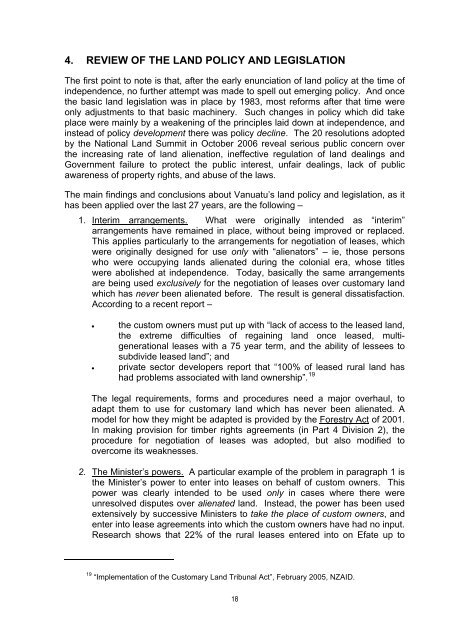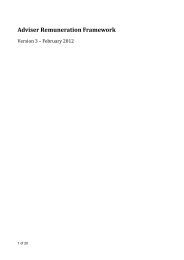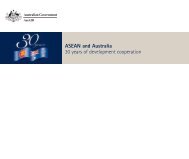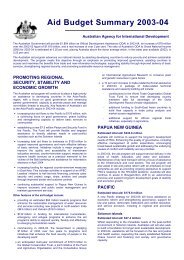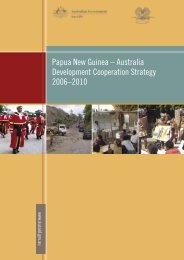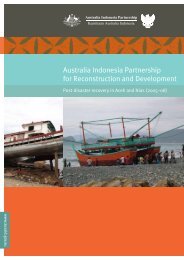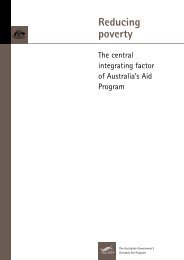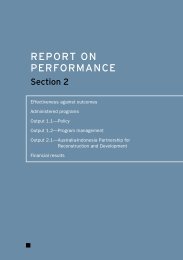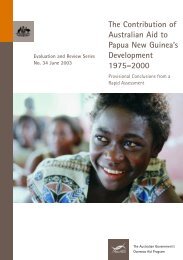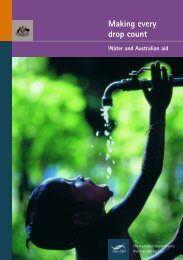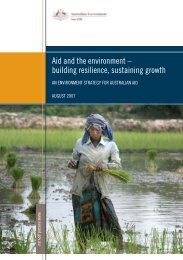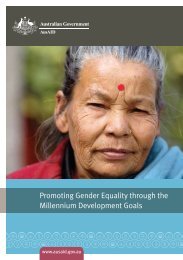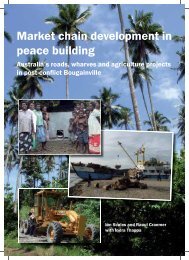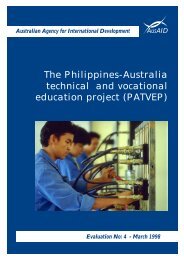Vanuatu Review of National Land Legislation, Policy and ... - AusAID
Vanuatu Review of National Land Legislation, Policy and ... - AusAID
Vanuatu Review of National Land Legislation, Policy and ... - AusAID
Create successful ePaper yourself
Turn your PDF publications into a flip-book with our unique Google optimized e-Paper software.
4. REVIEW OF THE LAND POLICY AND LEGISLATIONThe first point to note is that, after the early enunciation <strong>of</strong> l<strong>and</strong> policy at the time <strong>of</strong>independence, no further attempt was made to spell out emerging policy. And oncethe basic l<strong>and</strong> legislation was in place by 1983, most reforms after that time wereonly adjustments to that basic machinery. Such changes in policy which did takeplace were mainly by a weakening <strong>of</strong> the principles laid down at independence, <strong>and</strong>instead <strong>of</strong> policy development there was policy decline. The 20 resolutions adoptedby the <strong>National</strong> <strong>L<strong>and</strong></strong> Summit in October 2006 reveal serious public concern overthe increasing rate <strong>of</strong> l<strong>and</strong> alienation, ineffective regulation <strong>of</strong> l<strong>and</strong> dealings <strong>and</strong>Government failure to protect the public interest, unfair dealings, lack <strong>of</strong> publicawareness <strong>of</strong> property rights, <strong>and</strong> abuse <strong>of</strong> the laws.The main findings <strong>and</strong> conclusions about <strong>Vanuatu</strong>’s l<strong>and</strong> policy <strong>and</strong> legislation, as ithas been applied over the last 27 years, are the following –1. Interim arrangements. What were originally intended as “interim”arrangements have remained in place, without being improved or replaced.This applies particularly to the arrangements for negotiation <strong>of</strong> leases, whichwere originally designed for use only with “alienators” – ie, those personswho were occupying l<strong>and</strong>s alienated during the colonial era, whose titleswere abolished at independence. Today, basically the same arrangementsare being used exclusively for the negotiation <strong>of</strong> leases over customary l<strong>and</strong>which has never been alienated before. The result is general dissatisfaction.According to a recent report –the custom owners must put up with “lack <strong>of</strong> access to the leased l<strong>and</strong>,the extreme difficulties <strong>of</strong> regaining l<strong>and</strong> once leased, multigenerationalleases with a 75 year term, <strong>and</strong> the ability <strong>of</strong> lessees tosubdivide leased l<strong>and</strong>”; <strong>and</strong>private sector developers report that “100% <strong>of</strong> leased rural l<strong>and</strong> hashad problems associated with l<strong>and</strong> ownership”. 19The legal requirements, forms <strong>and</strong> procedures need a major overhaul, toadapt them to use for customary l<strong>and</strong> which has never been alienated. Amodel for how they might be adapted is provided by the Forestry Act <strong>of</strong> 2001.In making provision for timber rights agreements (in Part 4 Division 2), theprocedure for negotiation <strong>of</strong> leases was adopted, but also modified toovercome its weaknesses.2. The Minister’s powers. A particular example <strong>of</strong> the problem in paragraph 1 isthe Minister’s power to enter into leases on behalf <strong>of</strong> custom owners. Thispower was clearly intended to be used only in cases where there wereunresolved disputes over alienated l<strong>and</strong>. Instead, the power has been usedextensively by successive Ministers to take the place <strong>of</strong> custom owners, <strong>and</strong>enter into lease agreements into which the custom owners have had no input.Research shows that 22% <strong>of</strong> the rural leases entered into on Efate up to19 “Implementation <strong>of</strong> the Customary <strong>L<strong>and</strong></strong> Tribunal Act”, February 2005, NZAID.18


